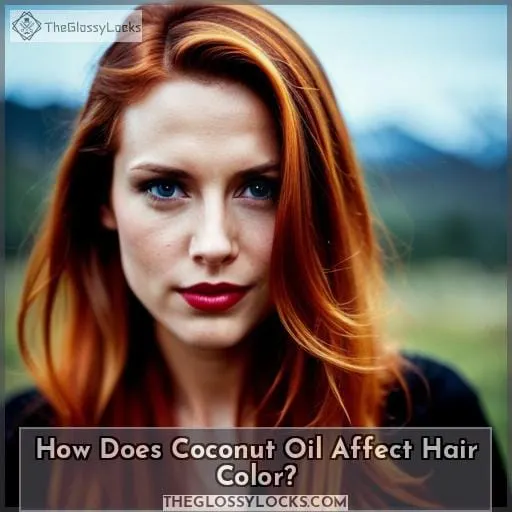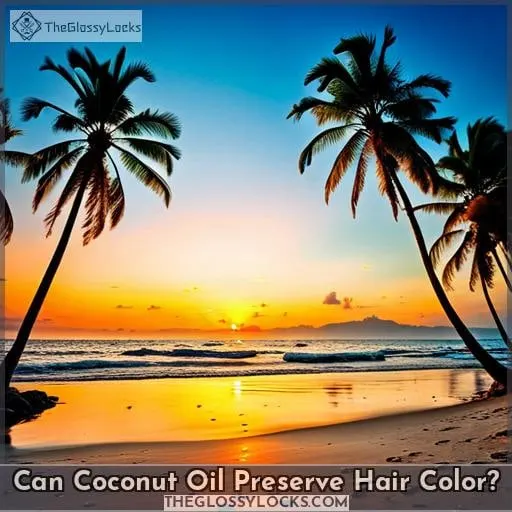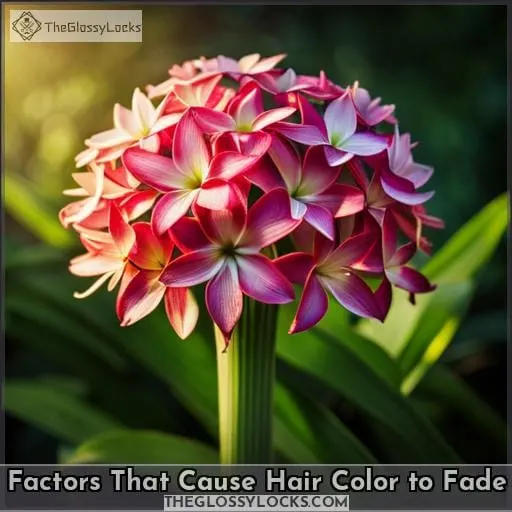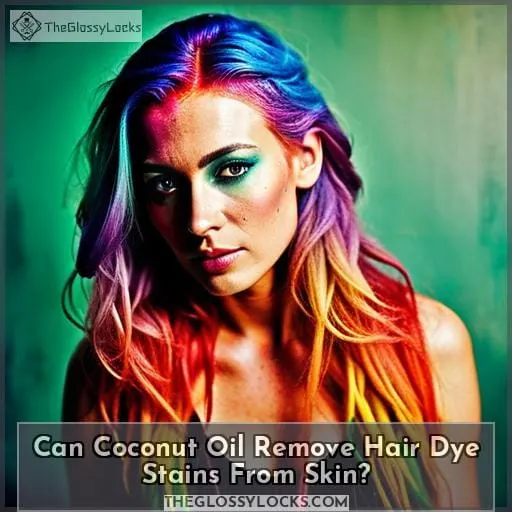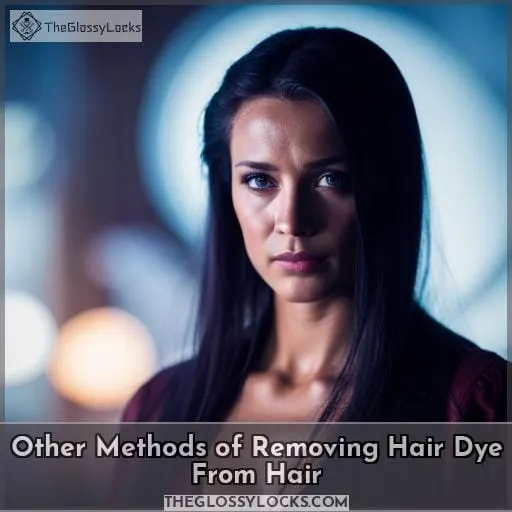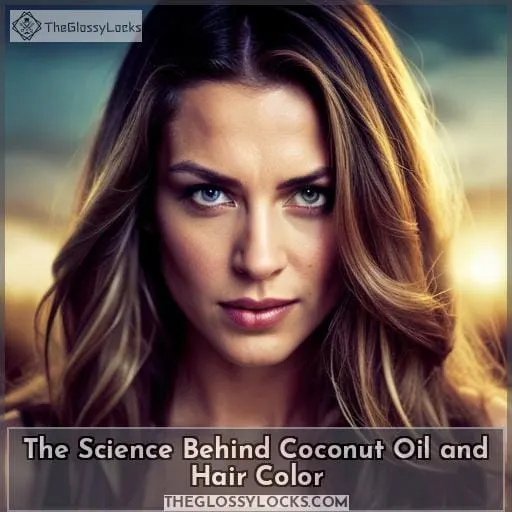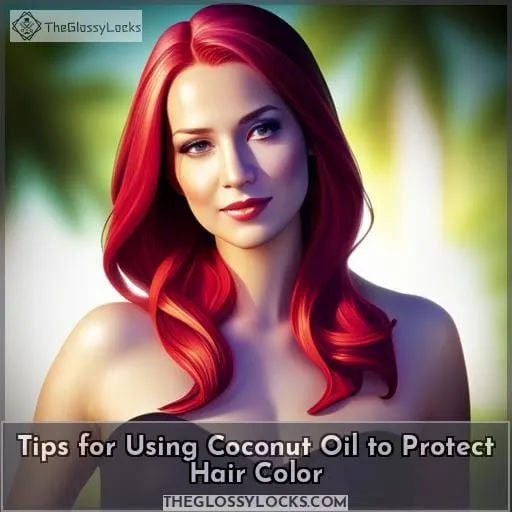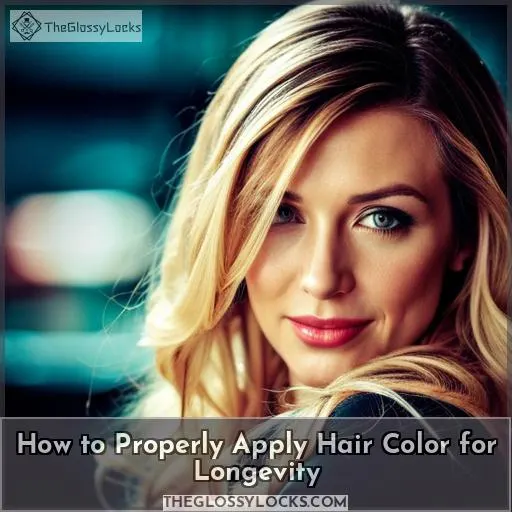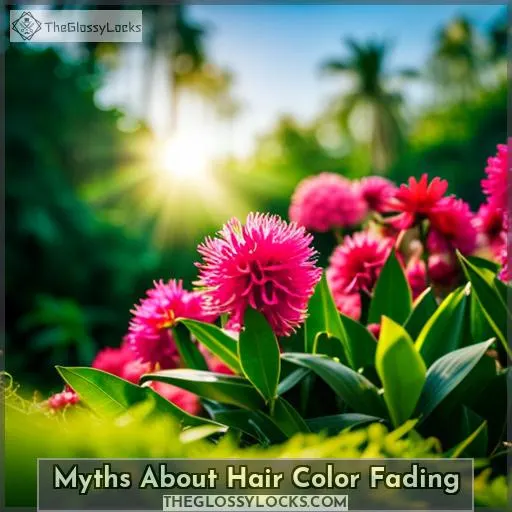This site is supported by our readers. We may earn a commission, at no cost to you, if you purchase through links.
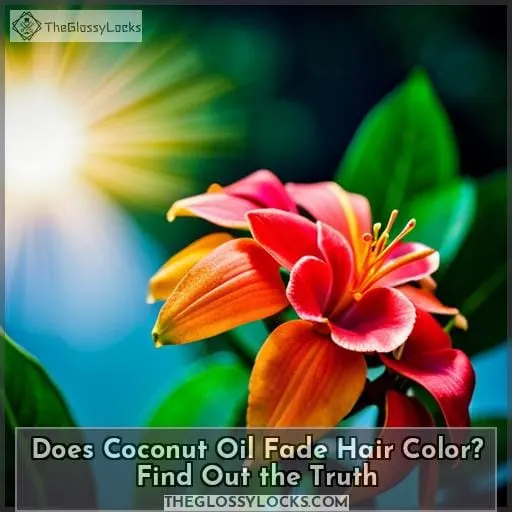 Curious if coconut oil fades hair color? You’re not alone! Many people are wondering whether this natural product can damage their carefully crafted locks. We’ll answer all your questions about the effects of coconut oil on colored hair, from its protective benefits to how it could potentially reduce vibrancy.
Curious if coconut oil fades hair color? You’re not alone! Many people are wondering whether this natural product can damage their carefully crafted locks. We’ll answer all your questions about the effects of coconut oil on colored hair, from its protective benefits to how it could potentially reduce vibrancy.
Read on and find out the truth behind using coconut oil with dyed or treated tresses.
For those with color-treated strands, we have good news: Coconut oil does not contain any lifting or stripping properties that would cause a noticeable effect on your hue—unless you’re doing something else at the same time like washing it too often or exposing it to heat styling without protection.
In fact, many experts believe that when used correctly in combination with other tips for preserving hair color and avoiding fading agents such as hot water and strong shampoos, applying a little bit of extra virgin coconut oil can help protect against discoloration caused by external factors while giving an added boost of moisture to nourish your mane!
Table Of Contents
- Key Takeaways
- Does Coconut Oil Fade Hair Color?
- How Does Coconut Oil Affect Hair Color?
- Can Coconut Oil Preserve Hair Color?
- Factors That Cause Hair Color to Fade
- Can Coconut Oil Remove Hair Dye Stains From Skin?
- Other Methods of Removing Hair Dye From Hair
- The Science Behind Coconut Oil and Hair Color
- Tips for Using Coconut Oil to Protect Hair Color
- How to Properly Apply Hair Color for Longevity
- Myths About Hair Color Fading
- Conclusion
Key Takeaways
- Coconut oil creates a protective barrier against fading and sun damage.
- Regular use nourishes hair and improves dye pigment retention.
- Coconut oil doesn’t fade hair color but can temporarily reduce vibrancy.
- It contains lauric acid, which helps retain moisture and offers UV protection.
Does Coconut Oil Fade Hair Color?
You’ve worked hard to get that perfect hair color, so you’ll be glad to know that coconut oil won’t cause it to fade away.
Coconut oil is rich in fatty acids like lauric acid, which helps restore moisture levels and strengthens each strand of hair.
Moreover, pre-poo treatments with coconut oil can temporarily reduce vibrancy, but this normalizes after a wash or two without stripping precious pigments from the locks.
For best results, use gentle shampoos free of sulfates. Sulfates are known for their ability to strip color faster than usual. Additionally, use warm water instead of hot water when washing newly colored manes.
Regular applications of coconut oil on wet or dry strands add further benefits by nourishing each lock, leaving them healthy and hydrated while adding shine at the same time.
How Does Coconut Oil Affect Hair Color?
You may have heard that coconut oil is beneficial for your hair, but did you know it can also help with hair color? Coconut oil provides moisture to the strands, which helps protect against fading and temporary reduction of vibrancy.
Moisturizing Effects
When it comes to hair color, have you ever wondered how coconut oil can help? Its moisturizing properties provide protection and vibrant locks. Coconut oil’s fatty acids, like lauric acid, offer antibacterial benefits, helping retain color longer.
It also adds shine and hydration, preventing fading from sun or chlorine exposure.
Protection Against Fading
Applying coconut oil to your locks can create a protective barrier against fading color. It works by locking in moisture, blocking UV damage, and balancing the oils on hair shafts for healthy-looking strands.
Its reparative properties help keep color vibrant while preventing sun damage and fade from daily styling routines. Coconut oil also seals cuticles with its natural fatty acids, shielding them from environmental aggressors that weaken hair’s structure and impact the shine and radiance of colored tresses.
Temporary Reduction of Vibrancy
Although coconut oil doesn’t strip away color, it can temporarily dull the vibrancy of your dye job – like a modern-day version of an old-fashioned rinse. To keep hair looking vibrant and healthy, maintain moisture balance, preserve color retention with pre-poo treatments, and avoid heat damage.
Coconut oil offers protection against fading; however, its effects are only temporary due to its ability to reduce vibrancy if left on for too long.
Can Coconut Oil Preserve Hair Color?
You can use coconut oil to help maintain your hair color and keep it looking vibrant. The moisturizing benefits of the fatty acids in coconut oil protect the vibrancy of your hair from heat, UV exposure, and sulfates.
Color retention is further improved with a pre-poo treatment that creates an additional layer on each strand. This helps to prevent pigment loss during washing or styling sessions. Hair experts agree that regular use of coconut oil will nourish each strand and allow natural oils to prevent moisture loss from sun damage or chlorine exposure when swimming outdoors.
Coconut oil won’t fade any permanent hues but can reduce temporary lifts until re-applied again for optimal results.
Factors That Cause Hair Color to Fade
You may have heard that coconut oil can help preserve hair color, but there are a number of other factors that can lead to fading. Sunlight exposure, hot water usage, strong shampoos, frequent washing, as well as heat styling, all contribute to the dulling of your hair’s hue over time.
Sunlight Exposure
Exposure to sunlight can cause hair color to dull and fade faster. Sunscreen for hair, UV protection, sun-resistant hairstyles, and using coconut oil are essential.
Hot Water Usage
Hot water can strip away hair color, so avoid using it to wash your locks. The effects of heat on hair are real: hydration is reduced, colors fade faster due to larger dye molecules.
Strong Shampoos
Strong shampoos strip color, so choose gentle options for vibrant hair. Clarifying benefits, shampoo selection, and hair health maintain color while preventing fading. Avoid sulfate-free and drying alcohols with frequent washing; use clarifying shampoo instead.
Heat Styling
Be wary of heat styling as it can damage and dull the hue of your tresses. Protect your hair with a hairstyling product or coconut oil before using heated tools.
Frequent Washing
Frequent washing with harsh detergents can strip away your color, leaving you with a duller hue. Shampoo selection is key to preserving the vibrancy and longevity of your hair dye; opt for gentle formulas without sulfates.
Additionally, protection from sunlight and heat damage is essential in keeping colors vivid. Coconut milk nourishment helps keep strands hydrated, while coconut oil prevents fading when used sparingly before or after coloring—never immediately after! Color application should also be done correctly for optimal results over time.
Can Coconut Oil Remove Hair Dye Stains From Skin?
Although coconut oil won’t erase hair dye from your locks, it can still help whisk away stains on your skin like a magician’s wand! It contains fatty acids such as lauric acid that offer antibacterial benefits and can be used to remove staining.
Coconut oil also provides great protection for the color of your hair. Its moisturizing properties prevent fading while adding shine. For stain prevention, apply Vaseline around the areas you wish to protect before coloring, but beware of any potential breakouts.
When using coconut oil on dyed hair, avoid overusing it so you don’t get an oily buildup. Use warm or cool water instead of hot water when washing for better retention of color vibrancy. To ensure long-lasting results with minimal fading, use gentle, sulfate-free shampoos that are less likely to strip off colors.
Cover up in UV rays exposure and try pre-poo treatments with coconut oils prior to coloring treatment. If the desired effect is subtlety rather than intensity variations in shades, choose semi-permanent versus demi-permanent dyes.
Other Methods of Removing Hair Dye From Hair
You might want to try some other methods for removing hair dye from your hair. DIY home remedies such as baking soda, vinegar, and dish soap can help with color correction when used in the correct proportions.
For more stubborn stains, lemon juice or anti-dandruff shampoo may be effective options.
If you’ve made a mistake while coloring your hair at home, a professional hairdresser is likely best equipped to fix it for you. They have access to better quality products than those available over the counter.
Coconut oil doesn’t fade away color, but its moisturizing properties protect from fading caused by sun exposure and washing agents that strip away pigment molecules faster than normal levels of usage would dictate otherwise!
Use coconut oil treatments before each wash or even heat styling session along with protective sprays and cool water washes whenever possible.
The Science Behind Coconut Oil and Hair Color
By applying nourishing coconut oil, you can help protect your hair color from fading due to UV rays and other environmental factors. For example, Jane had her hair dyed a bright red but found that the sun caused it to dull quickly – she started using coconut oil as a pre-treatment before going outside and noticed an improvement in the vibrancy of her color.
Coconut oil is composed of saturated fatty acids like lauric acid, which offer antibacterial properties for better hair health while keeping moisture locked into strands.
To maintain vibrant hues, regular trims are recommended every eight weeks. However, use gentle sulfate-free shampoos instead of harsh detergents, which can strip away dye molecules faster than expected and cause premature fading over time!
Apply some extra protection by using sunscreen on scalp areas if spending long hours outdoors under direct sunlight exposure with no hat covering the head.
Additionally, keep locks hydrated throughout weekdays (not just weekends) because low humidity levels result in dryness and brittle strands that are easily prone to breakage, split ends, and quicker pigment leakage.
Tips for Using Coconut Oil to Protect Hair Color
Using coconut oil for hair color protection is a wise choice. Pre-Poo treatments with coconut oil can help lock in color and prevent fading, while opting for cool or warm water instead of hot when washing your hair will also maintain the vibrancy of your look.
Heat styling should be done carefully to avoid damage and quick fading, as well as avoiding frequent washing, which can strip away dye molecules from the hair shafts.
Pre-Poo Treatment
Before coloring your hair or refreshing a fading shade, give it some extra love with a pre-poo treatment of coconut oil. This natural wonder helps balance moisture and prevents color from fading too quickly by nourishing the scalp and strands.
Its fatty acids offer antibacterial benefits to keep hair healthy for longer-lasting vibrancy.
Choosing the Right Water Temperature
For optimal color retention, it is important to note the water temperature when washing hair; cooler temperatures preserve up to 50% more dye than warm. Coconut oil helps protect hair color from chlorine, UV rays, and hot water while also moisturizing and nourishing.
Protecting Against Heat Styling
Protect your hair color from heat damage by using a protectant spray before styling. Heat protection products keep color vibrant and prevent fading, so use them when blow-drying or flat ironing. Coconut oil can also be used to maintain color vibrancy as it contains fatty acids that provide antibacterial benefits.
Avoid hot water for washing as this can strip away the dye molecules; warm or cool is best! Finally, consider adding lemon juice to coconut oil treatments for extra shine and luster without damaging your hair dye job.
Avoiding Frequent Washing
Try to minimize frequent washing as it can strip the color from your hair, leaving you with dull and lackluster locks. Use warm or cool water when washing, select a gentle shampoo, avoid too much sun exposure, and keep hair hydrated with coconut oil treatments.
How to Properly Apply Hair Color for Longevity
To ensure vibrant color that lasts, make sure to apply your hair dye correctly. Here are a few tips for protecting and preserving your color:
- Pre-treat with coconut oil or other natural oils to reduce fading and breakage.
- Always use cool water when rinsing out the dye so it won’t be stripped away more quickly than necessary.
- Avoid heat styling as much as possible since it can damage hair pigment, leading to dullness over time.
- Use clarifying shampoo sparingly; too much will strip the moisture from strands, causing them not to retain color properly.
With proper care, you can keep dyed locks looking their best! Regular treatments of coconut oil combined with gentle cleansing products help maintain healthiness while keeping colors bright and true between touch-ups or re-dyes.
Myths About Hair Color Fading
As you consider dyeing or lightening your hair, it’s important to be aware of the potential myths and risks associated with color fading. Ammonia-free alternatives provide a gentler alternative for depositing pigment in the hair shaft.
Sulfate-free shampoos can help prevent stripping away natural oils that protect color from fading. Lemon juice is sometimes used as an effective lightener. Vaseline can be applied around the scalp area to protect skin from staining when using dyes, but it may cause breakouts if left on too long.
Plucking gray hairs may also offer temporary reprieve but should not replace regular coloring appointments.
Ammonia Alternatives
Behold the power of ammonia alternatives! Keep hair color long-lasting and vibrant.
Sulfate-Free Shampoos
Swapping out sulfates for a gentle, sulfate-free shampoo can help keep your hair color vibrant and reduce fading. With these products, you get the benefit of fewer chemicals while locking in moisture and providing UV protection for lasting color.
Lemon Juice Lightening
Try lightening your hair with lemon juice if you’re looking for a more natural way to achieve brighter tones. Its citric acid and vitamin C properties can help reduce darkness in color-treated tresses.
Apply the mixture correctly for best results, avoiding contact with the scalp or skin. Natural alternatives like chamomile tea are gentler than store-bought bleaches but still have lightening effects when used regularly over time.
Vaseline for Skin Protection
Protect your skin from hair color stains with a thin layer of Vaseline! It’s an effective barrier against harsh dyes and can be used to help remove any dye that may get on the skin. Its protective properties are also great for pre-dyeing preparations, helping reduce irritation when applying hair color.
Plus, it offers hydrating benefits, so you don’t have to resort to coconut oil alternatives if you’re worried about fading your hue.
Plucking Gray Hair
If you’re dealing with grays, plucking them is an alternative to coloring. Hair dye isn’t always necessary when a few strands of gray appear. Plucking can help maintain your natural hair color and even prevent more graying from occurring.
Natural remedies such as coconut oil can also contribute to gray hair prevention and are better for overall health than harsh dyes or bleaches.
Conclusion
An oasis of beauty, a shield of protection, the truth of coconut oil for hair is a multi-faceted one. Does coconut oil fade hair color? The answer is both yes and no. While it can reduce the vibrancy of the hair color, it also helps protect the color from fading due to sun exposure, hot water, strong shampoos, and heat styling.
Coconut oil also helps preserve color when used as a pre-poo treatment and can help remove dye stains from skin. To ensure long-lasting color, proper application of hair color is key. Myths such as using ammonia alternatives, sulfate-free shampoos, lemon juice lightening, vaseline for skin protection, and plucking gray hair should be ignored.
Coconut oil is a beneficial and safe way to protect your hair color, and with proper usage and care, it can help you achieve beautiful, vibrant hair color.

